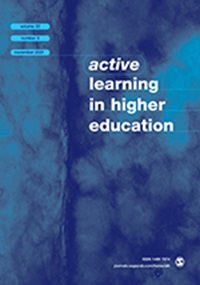“这让我觉得犯错是可以的”:学生的忘恩负义经历
IF 3.8
1区 教育学
Q1 EDUCATION & EDUCATIONAL RESEARCH
引用次数: 3
摘要
本文以反思为基础的自我评价为研究对象,以解释现象学的方法研究学生在大学课程中的不评分体验。在学生评价方面,不分级策略回应了传统分级制度的局限性,特别是在培养所需技能和能力方面,如适应性、创造性思维和自我管理。通过对8名学生的深入访谈,本研究报告了四个体验主题,这些主题描述了向非评分转变的特征:去游戏化,或颠覆传统评分系统中评估的“游戏化”本质;有思考和反思的时间,为复习和深化学习创造空间;丰富的交流,或师生之间的持续反馈;还有学习社区,学生们觉得他们是团队的一部分,而不是孤立的个人。讨论了进一步研究的考虑,以及在其他课程中实施不评分。本文章由计算机程序翻译,如有差异,请以英文原文为准。
“It made me feel like it was okay to be wrong”: Student experiences with ungrading
This paper presents an interpretative phenomenological analysis study of students’ experiences with ungrading in the form of reflection-based self-evaluation in a college course. In the landscape of student evaluation, ungrading strategies respond to the limitations of traditional grading systems, particularly with respect to cultivating in-demand skills and capacities, such as adaptability, creative thinking, and self-management. Through in-depth interviews with eight students, this study reports on four experiential themes that characterize the switch to ungrading: de-gamification, or unsettling the “gamified” nature of evaluation in the traditional grading system; time to think and reflect, creating space for review and the deepening of learning; rich communication, or continual feedback between teacher and student; and learning community, in which students felt like they were part of a team effort rather than siloed individuals. Considerations for further research, as well as implementation of ungrading in other courses, are discussed.
求助全文
通过发布文献求助,成功后即可免费获取论文全文。
去求助
来源期刊

Active Learning in Higher Education
EDUCATION & EDUCATIONAL RESEARCH-
CiteScore
13.20
自引率
12.00%
发文量
31
期刊介绍:
Active Learning in Higher Education is an international, refereed publication for all those who teach and support learning in higher education (HE) and those who undertake or use research into effective learning, teaching and assessment in universities and colleges. The journal is devoted to publishing accounts of research covering all aspects of learning and teaching concerning adults in higher education. Non-discipline specific and non-context/country specific in nature, it comprises accounts of research across all areas of the curriculum; accounts which are relevant to faculty and others involved in learning and teaching in all disciplines, in all countries.
 求助内容:
求助内容: 应助结果提醒方式:
应助结果提醒方式:


